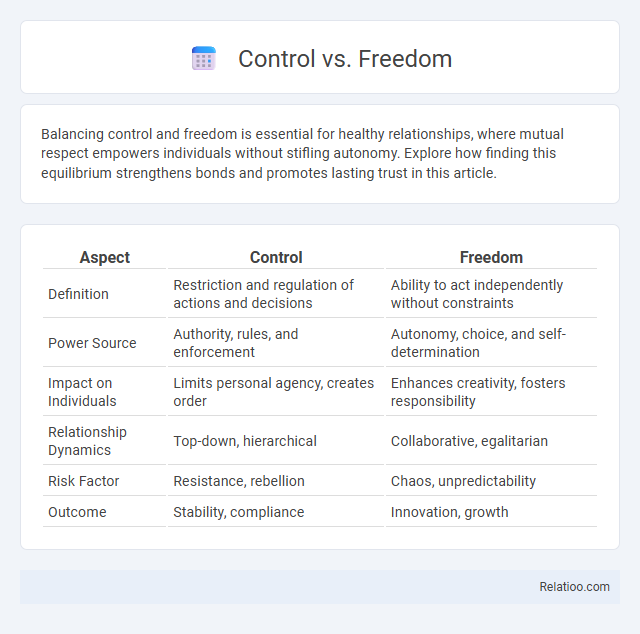Balancing control and freedom is essential for healthy relationships, where mutual respect empowers individuals without stifling autonomy. Explore how finding this equilibrium strengthens bonds and promotes lasting trust in this article.
Table of Comparison
| Aspect | Control | Freedom |
|---|---|---|
| Definition | Restriction and regulation of actions and decisions | Ability to act independently without constraints |
| Power Source | Authority, rules, and enforcement | Autonomy, choice, and self-determination |
| Impact on Individuals | Limits personal agency, creates order | Enhances creativity, fosters responsibility |
| Relationship Dynamics | Top-down, hierarchical | Collaborative, egalitarian |
| Risk Factor | Resistance, rebellion | Chaos, unpredictability |
| Outcome | Stability, compliance | Innovation, growth |
Understanding Control and Freedom
Understanding control involves recognizing the structures and limitations that influence your decisions, while freedom reflects the ability to act without undue restriction or coercion. Your sense of autonomy strengthens when you navigate between these forces, balancing the need for security with the desire for self-expression. Control and freedom are dynamic concepts that shape personal empowerment and societal interaction.
Historical Perspectives on Control and Freedom
Historical perspectives on control and freedom reveal evolving dynamics between authority and individual autonomy shaped by cultural, political, and social forces across eras. Empires, such as the Roman and the British, exercised control through laws and military power, while revolutions like the American and French emphasized freedom through democratic ideals and human rights. Understanding these shifts helps you appreciate the complex balance societies strive for between governance and liberty.
Psychological Impacts of Control vs Freedom
Control imposes restrictions that may lead to increased stress, anxiety, and feelings of powerlessness, while freedom promotes autonomy, creativity, and psychological well-being. Your ability to exercise freedom nurtures intrinsic motivation and self-efficacy, essential for mental health and personal growth. Conversely, subjugation often intensifies feelings of helplessness, depression, and diminished self-worth due to the persistent lack of control in one's environment.
Control in Personal Relationships
Control in personal relationships often manifests through subtle manipulation, setting boundaries that prioritize one partner's needs over the other, and monitoring actions or communications closely. This dynamic can erode trust and reduce emotional autonomy, leading to feelings of powerlessness and resentment. Establishing healthy control involves mutual respect and open dialogue, ensuring both partners feel valued and free to express themselves without fear of domination.
Freedom and Individual Empowerment
Freedom empowers individuals to make choices that align with their authentic selves, fostering personal growth and creativity. Your ability to exercise autonomy enhances self-confidence and promotes resilience against external constraints. Prioritizing freedom cultivates an environment where individual empowerment thrives, enabling meaningful contributions to society.
Societal Structures: Balancing Control and Freedom
Societal structures require a delicate balance between control and freedom to maintain order while promoting individual autonomy. Effective governance implements rules and regulations that prevent chaos and protect collective interests without excessively infringing on personal liberties. Excessive control can lead to subjugation and social unrest, whereas too much freedom may result in disorder, making the equilibrium vital for societal stability and progress.
The Role of Control in the Workplace
Workplace control structures are pivotal in shaping organizational efficiency, employee behavior, and overall productivity. You benefit from clear guidelines and policies that establish authority while ensuring operational consistency and risk management. Balancing control with autonomy fosters an environment where innovation thrives without descending into chaos or subjugation.
Freedom in Creative Expression
Freedom in creative expression empowers individuals to break conventional boundaries, fostering innovation and originality. It cultivates an environment where artists and creators explore diverse perspectives without censorship or restriction. This autonomy drives cultural evolution and personal fulfillment, contrasting sharply with control and subjugation that stifle imagination and limit artistic potential.
Navigating Conflict Between Control and Freedom
Navigating conflict between control and freedom requires balancing authority with individual autonomy to foster cooperation without suppressing creativity. Effective conflict resolution strategies emphasize transparent communication, mutual respect, and adaptable boundaries to prevent escalation. Emphasizing shared goals enables parties to reconcile differing needs for control and freedom while maintaining harmony.
Finding Harmony: Striking the Right Balance
Finding harmony between control, freedom, and subjugation requires understanding the delicate interplay where autonomy is preserved without chaos and order does not lead to oppression. Effective systems balance individual rights with collective responsibilities, ensuring governance fosters empowerment rather than dominance. Achieving this equilibrium promotes societal stability, personal fulfillment, and sustainable progress.

Infographic: Control vs Freedom
 relatioo.com
relatioo.com